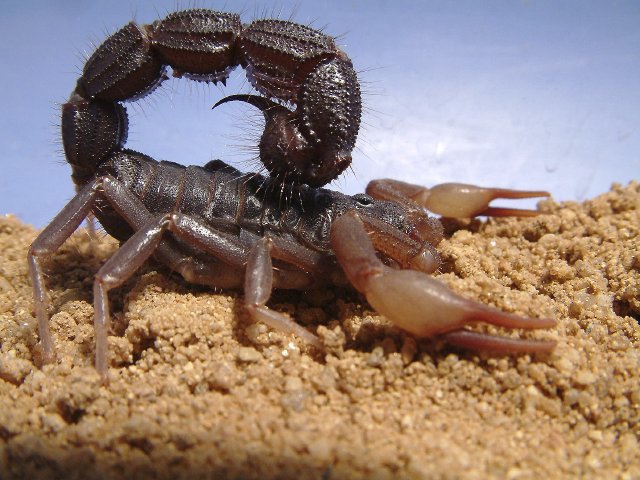
Imagine you’re sitting at a café, discussing the latest nature documentary. You might say, “Did you know that some scorpions can be deadly?” This is where the conversation about the fat-tailed scorpion often begins. It’s often portrayed as a villain in the animal kingdom, but is it really as lethal as people think? The truth is, while these scorpions can deliver a seriously painful sting, the real story is much more nuanced.
Understanding the Fat-Tailed Scorpion
The fat-tailed scorpion, or *Androctonus*, is not just any ordinary scorpion. Found mainly in North Africa and the Middle East, this species stands out due to its stout body and venom potency. Its name comes from its thick, bulbous tail, which houses a venom gland. When threatened, this scorpion raises its tail, showcasing a unique defense mechanism. But why does its venom pack such a punch?
The venom of the fat-tailed scorpion is primarily neurotoxic, meaning it affects the nervous system. This potency is what makes its sting so feared. But even though it sounds like something out of a horror movie, it’s essential to remember that not every encounter leads to fatality. Many factors, like the size of the person stung and how quickly they receive treatment, play a role in the outcome.
How Dangerous Is Their Sting?
You might be wondering just how painful a fat-tailed scorpion sting can be. The truth is, while the sting is excruciating, it doesn’t automatically lead to death. For most healthy adults, the sting can feel like a mix of a bee sting and a painful cramp. Symptoms can include intense pain, swelling, and even nausea. However, for vulnerable populations—like children, the elderly, or those with preexisting conditions—the sting can be more serious.
In fact, the World Health Organization classifies fat-tailed scorpions as a significant public health concern in some areas. The question is, how many people die from these stings? While exact numbers vary from region to region, it’s estimated that thousands of scorpion stings occur annually, leading to a few hundred deaths. This statistic highlights the importance of understanding the risks and taking precautions, especially in regions where these creatures are prevalent.
Myths vs. Reality: Can They Kill You?
In movies and books, the fat-tailed scorpion often plays the role of a lethal assassin, leaving a trail of destruction in its wake. But here’s the thing: it’s crucial to separate myths from facts. While the fat-tailed scorpion can cause severe reactions in people, it’s not a serial killer on the loose. Most healthy adults won’t face life-threatening issues from a sting, especially if they receive prompt medical attention.
Let’s delve into some common myths. One popular belief is that the mere sight of a fat-tailed scorpion can send a person into cardiac arrest. Untrue. While fear can heighten anxiety, it’s unlikely that merely seeing one would cause a fatal incident. Additionally, there’s a myth that these scorpions are aggressive and will attack if provoked. In reality, they prefer to scuttle away than confront a person.
What Should You Do If Stung?
If you or someone you know gets stung, it’s essential to act quickly. Here are the steps to follow:
- Stay calm—panic can worsen symptoms.
- Wash the sting area with soap and water.
- Apply a cool compress to reduce swelling and pain.
- Seek medical attention quickly if symptoms worsen or if the person stung is a child or elderly.
It’s also good to remember that anti-venom is available for severe cases, but it’s usually reserved for those in critical condition.
Preventing Scorpion Stings
Prevention is crucial, especially if you live in an area where fat-tailed scorpions are common. Here are some tips to keep yourself safe:
- Wear closed-toe shoes when walking outside.
- Keep your home and yard tidy, eliminating hiding spots.
- Seal cracks and openings in your home.
- Use caution when reaching into dark spaces or moving items stored outside.
Taking these precautions can significantly reduce your chances of an unwanted encounter.
The Bigger Picture: Understanding Scorpions
While it’s easy to focus on the fat-tailed scorpion’s dangerous reputation, it’s vital to understand the role these creatures play in our ecosystem. Scorpions help control pest populations, feeding on insects and other small animals. They are a crucial part of the balance of nature, much like wolves in a forest.
Understanding how these creatures fit into our world can foster a healthier respect for them. Instead of viewing them solely as threats, we can appreciate their essential role in the environment, which might help alleviate some of the fear surrounding them.
In conclusion, while the fat-tailed scorpion can deliver a painful sting and, in rare cases, cause death, it’s essential to separate reality from sensationalized myths. With the right information and precautions, you can appreciate these fascinating creatures without being overwhelmed by fear. So next time someone warns you about the fat-tailed scorpion, you can confidently share what you’ve learned. Knowledge is power, and it can help demystify these misunderstood arachnids.

